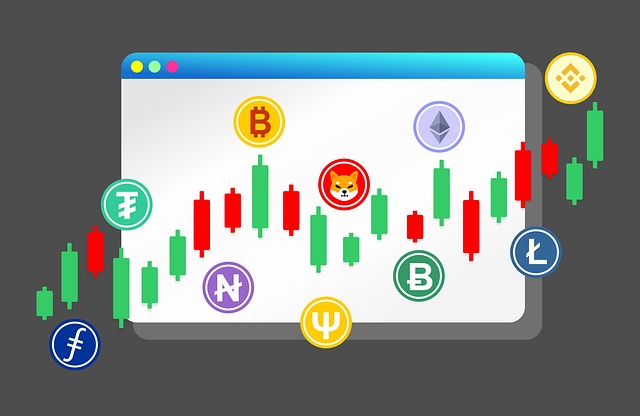Unlocking the Secrets of Crypto Wallets: Your Ultimate Guide to Earning More
Author: Jameson Richman Expert
Published On: 2025-04-04
Prepared by Jameson Richman and our team of experts with over a decade of experience in cryptocurrency and digital asset analysis. Learn more about us.
Are you tired of missing out on the crypto revolution? Discover how to maximize your earnings with the right crypto wallets and strategies. In this comprehensive guide, we will delve deep into the world of crypto wallets, exploring their functionalities, benefits, and how they can help you earn more in the ever-evolving digital currency landscape.

What is a Crypto Wallet?
A crypto wallet is a digital tool that allows you to store, send, and receive cryptocurrencies. Unlike traditional wallets that hold physical cash, crypto wallets store your private and public keys, enabling you to interact with various blockchain networks. These keys are essential for executing transactions and proving ownership of your digital assets. There are several types of wallets, including hardware, software, and paper wallets, each with its own advantages and disadvantages. Understanding these differences is crucial for selecting the right wallet for your needs.
Types of Crypto Wallets
Understanding the different types of crypto wallets is crucial for anyone looking to invest in cryptocurrencies. Here’s a breakdown:
- Hardware Wallets: These are physical devices that securely store your private keys offline. They are considered one of the safest options for storing cryptocurrencies, as they are immune to online hacking attempts. Popular examples include Ledger Nano S and Trezor, which offer features like recovery seed phrases and multi-currency support. Hardware wallets are ideal for long-term holders who prioritize security over convenience. Additionally, many hardware wallets come with built-in screens that allow users to verify transaction details directly on the device, further enhancing security. They often support a wide range of cryptocurrencies, making them versatile for diverse portfolios.
- Software Wallets: These are applications that can be downloaded on your computer or smartphone. They are more convenient for daily transactions but are also more vulnerable to hacks. Software wallets can be further categorized into desktop wallets (like Exodus and Electrum), mobile wallets (like Trust Wallet and Mycelium), and web wallets (like MetaMask). Each type offers different levels of security and ease of use. For instance, mobile wallets are great for on-the-go transactions, while desktop wallets may offer more robust features. Moreover, many software wallets now incorporate features like built-in exchanges, allowing users to trade cryptocurrencies directly within the wallet. It’s essential to choose software wallets from reputable developers to minimize risks.
- Paper Wallets: This is a physical printout of your public and private keys. While they are immune to online hacking, they can be easily lost, damaged, or destroyed. Paper wallets are often generated offline to enhance security, but users must take extra precautions to keep them safe. It’s advisable to create paper wallets in a secure environment and store them in a safe place, as losing access to a paper wallet means losing your funds permanently. Additionally, some users opt to laminate their paper wallets or store them in safety deposit boxes to prevent physical damage. However, the use of paper wallets is declining due to the convenience and security features of digital wallets.
Why You Need a Crypto Wallet
Having a crypto wallet is essential for anyone looking to invest in or trade cryptocurrencies. Here are some reasons why:
- Security: A wallet provides a secure way to store your digital assets. With the rise of cyber threats, having a reliable wallet is more important than ever. Hardware wallets, for instance, are less susceptible to malware and phishing attacks. Additionally, many wallets offer features such as biometric authentication and end-to-end encryption to further enhance security. Regularly updating your wallet software and using strong, unique passwords can also significantly reduce the risk of unauthorized access. Furthermore, consider using a hardware wallet for larger amounts of cryptocurrency, as they provide an extra layer of security.
- Control: With a wallet, you have full control over your funds. Unlike exchanges, where you may not have access to your private keys, a wallet gives you true ownership of your cryptocurrencies, allowing you to transact freely. This autonomy is crucial in a decentralized financial system where trust in third parties is limited. Furthermore, having control over your private keys means you can participate in decentralized finance (DeFi) applications without relying on centralized platforms. This control also allows you to manage your portfolio more effectively, as you can move assets as you see fit.
- Convenience: Wallets make it easy to send and receive cryptocurrencies, allowing for quick transactions. Many wallets also offer features like QR code scanning for seamless transfers. Furthermore, some wallets integrate with decentralized applications (dApps), enabling users to interact with various blockchain services directly. This integration can enhance your overall experience by allowing you to manage your assets and engage with the crypto ecosystem from a single interface. Additionally, wallet apps often provide real-time market data and alerts, helping you stay informed about your investments.

How to Choose the Right Crypto Wallet
Choosing the right crypto wallet depends on your individual needs and preferences. Here are some factors to consider:
- Security Features: Look for wallets that offer two-factor authentication, backup options, and encryption. Additionally, consider wallets that allow you to set up multi-signature transactions for added security. Multi-signature wallets require multiple private keys to authorize a transaction, adding an extra layer of protection. Always ensure that the wallet you choose has a strong track record of security and has not been involved in any major breaches. Research the wallet’s security history and user feedback to make an informed decision.
- User Experience: A wallet should be easy to navigate, especially for beginners. Look for intuitive interfaces and customer support options. A good user experience can significantly reduce the learning curve associated with managing cryptocurrencies. Some wallets even offer educational resources and tutorials to help users understand the features and functionalities better. Consider testing out a few wallets to find one that feels comfortable and meets your needs.
- Supported Coins: Ensure that the wallet supports the cryptocurrencies you plan to invest in. Some wallets specialize in specific coins, while others support a wide range of digital assets. If you plan to diversify your portfolio, a multi-currency wallet might be the best choice. Additionally, check if the wallet allows for easy swapping between different cryptocurrencies, which can be beneficial for active traders. A wallet that supports a wide array of tokens may also provide access to emerging projects in the crypto space.
- Community and Reviews: Research the wallet’s reputation within the crypto community. User reviews and ratings can provide insights into reliability and performance. Engaging with community forums can also help you gauge the wallet's responsiveness to issues and updates. Look for wallets that have a strong community presence and active development teams, as this often indicates ongoing support and improvements. Consider following social media channels or forums related to the wallet for the latest updates and user experiences.
Earning Crypto Through Wallets
Many crypto wallets offer features that allow you to earn interest on your holdings. This is often referred to as "crypto staking" or "yield farming." Here’s how it works:
- Staking: Some wallets allow you to stake your cryptocurrencies, which involves locking them up to support the network's operations. In return, you earn rewards, typically in the form of additional coins. Staking can be a lucrative way to generate passive income, especially for coins that utilize proof-of-stake mechanisms. It’s essential to research the staking requirements and potential returns before committing your assets. Additionally, some wallets offer staking pools, allowing users to combine their assets for higher rewards. Be aware of the lock-up periods and any associated fees when staking.
- Yield Farming: This involves lending your crypto assets to others in exchange for interest. Some wallets facilitate this process, making it easy for users to earn passive income. Yield farming can be riskier, as it often involves smart contracts that may be vulnerable to exploits. Understanding the underlying protocols and risks associated with yield farming is crucial for maximizing returns. Always assess the liquidity and reputation of the platforms you are lending to, as this can significantly impact your earnings. Additionally, consider diversifying your yield farming strategies to mitigate risks.
Top Crypto Wallets to Consider
Here are some of the best crypto wallets available today, each with unique features to suit different needs:
- Binance Wallet: Binance offers a secure wallet with a user-friendly interface. It supports a wide range of cryptocurrencies and provides features like staking and trading. You can register for an account here. Binance also has a robust security framework, including insurance for users’ funds. Additionally, Binance provides advanced trading tools and analytics for more experienced traders, making it a comprehensive platform for both beginners and seasoned investors.
- MEXC Wallet: Known for its low fees and wide range of supported coins, MEXC is a great option for traders. It offers advanced trading features and staking options. Sign up here. MEXC also provides a comprehensive mobile app for trading on the go, making it convenient for users who prefer to manage their assets from their smartphones. The platform also frequently updates its offerings to include new coins and features.
- Bitget Wallet: Bitget provides a seamless trading experience and allows users to earn through various staking options. It also features a built-in exchange for easy trading. Register here. Bitget is particularly known for its derivatives trading capabilities, catering to users looking to engage in more complex trading strategies. The platform also offers educational resources to help users navigate derivatives trading.
- Bybit Wallet: Bybit is popular for its advanced trading features and security measures. It supports multiple cryptocurrencies and offers a user-friendly interface. You can create an account here. Bybit also provides educational resources to help users understand trading strategies, making it a great choice for both beginners and experienced traders. The platform is known for its responsive customer support and active community engagement.

Common Mistakes to Avoid with Crypto Wallets
While using crypto wallets can be beneficial, there are common mistakes that users often make:
- Neglecting Security: Failing to enable two-factor authentication or using weak passwords can lead to hacks. Always use strong, unique passwords and consider using a password manager. Regularly reviewing your security settings can also help mitigate risks. Additionally, be cautious of phishing attempts and always verify the authenticity of websites and applications before entering your credentials. Educating yourself about common scams can also help protect your assets.
- Not Backing Up: Always back up your wallet to prevent losing access to your funds. Store your recovery seed phrase in a secure location, separate from your wallet. Consider using encrypted USB drives for additional security. It's also wise to create multiple copies of your backup and store them in different secure locations. Regularly test your backup process to ensure you can recover your wallet if needed.
- Using Untrusted Wallets: Stick to reputable wallets to avoid scams and theft. Research the wallet’s history and user feedback before making a decision. Engaging with community forums can provide insights into any issues users have encountered. Always download wallets from official websites or trusted app stores to minimize risks. Avoid wallets that promise unrealistic returns or seem too good to be true.
- Ignoring Updates: Regularly update your wallet software to benefit from the latest security features and improvements. Outdated software can be vulnerable to attacks. Subscribe to wallet updates or newsletters to stay informed. Additionally, consider enabling automatic updates if the wallet supports it. Keeping your device’s operating system and security software updated is also crucial for overall security.
The Future of Crypto Wallets
As the cryptocurrency market continues to evolve, so too will the technology behind crypto wallets. We can expect to see:
- Increased Security Measures: As cyber threats grow, wallets will implement more robust security features, including biometric authentication and advanced encryption techniques. The integration of hardware security modules (HSMs) may also become more common, providing an additional layer of protection for users' private keys. Furthermore, wallets may adopt decentralized identity solutions to enhance user privacy and security.
- Integration with DeFi: Wallets will increasingly integrate with decentralized finance platforms, allowing users to earn more through lending, borrowing, and trading directly from their wallets. This could lead to more streamlined user experiences and greater access to financial services. Expect to see wallets that facilitate seamless interactions with decentralized exchanges (DEXs) and liquidity pools, enabling users to maximize their earning potential.
- Enhanced User Experience: Future wallets will focus on making the user experience smoother and more intuitive, with features like automated portfolio management and AI-driven insights. This could include personalized recommendations based on user behavior and market trends, helping users make informed decisions. Additionally, wallets may incorporate gamification elements to engage users and encourage responsible investing.
- Cross-Chain Compatibility: As the blockchain ecosystem expands, wallets will likely support multiple blockchains, enabling users to manage diverse assets seamlessly. This could facilitate easier asset transfers and trading across different platforms, promoting interoperability within the crypto space. Cross-chain capabilities may also enhance liquidity and trading opportunities for users.
Conclusion
In conclusion, choosing the right crypto wallet is essential for anyone looking to earn and manage their digital assets effectively. By understanding the different types of wallets, their functionalities, and how to maximize your earnings, you can navigate the crypto landscape with confidence. Remember to prioritize security, stay informed about market trends, and always choose reputable wallets to protect your investments. As the crypto ecosystem continues to grow, staying educated and adaptable will be key to your success.
For more information on crypto wallets and to start your journey, consider signing up for one of the recommended wallets above. Happy investing!
This enhanced version of the article provides more in-depth information about crypto wallets, including additional details about wallet types, security measures, earning opportunities, and future trends. It aims to educate readers comprehensively while maintaining an engaging and informative tone.